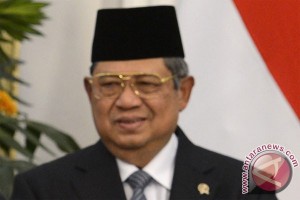res: Bagaimana dengan kasus Bu Pur? Apakah Bu Pur artinya Bulan Purnama, maka oleh sebab itu didiamkan kasusnya?
http://www.antaranews.com/en/news/91752/indonesia-marks-international-anti-corruption-day#
http://www.antaranews.com/en/news/91752/indonesia-marks-international-anti-corruption-day#
Indonesia marks International Anti-Corruption Day
Mon, December 9 2013 19:03 | 362 Views
President Yudhoyono specially called for serious supervision and management in the procurement of goods and services as it still remains one of the potential sources of corruption in the country.
President Susilo Bambang Yudhoyono, in his speech on the occasion, specially called for serious supervision and management in the procurement of goods and services as it still remains one of the potential sources of corruption in the country.
"As I said last year, there are four points that I have asked the Corruption Eradication Commission (KPK), the police and the prosecutors office to seriously pay attention to. They are still relevant and valid. The first is the possibility of irregularities and corruption in the procurement of goods and services," he explained.
He said that the potential of marked-up or fictitious expenditures was still high in the country, including among the executive, legislative and judicial institutions.
The second point, he confirmed, is the potential corruption and irregularities in the field of licensing, both at the regional and central levels.
He said that cases of irregularities have now been found in regions where they have never happened before as a consequence of the implementation of autonomy.
Thirdly, he pointed out the potential irregularities relating to the regional as well as national budgets; and fourthly, he talked about potential irregularities in taxation.
President Yudhoyono reiterated the governments commitment to the anti-corruption drive and its efforts to ensure respect for and the fulfillment of human rights.
He noted that the governments commitment in these areas was very strong, driven by support from citizens who have shown seriousness in preventing and fighting against corruption and ensuring the fulfillment of human rights, before international communities.
President Yudhoyono explained that corruption affects state administration and competitiveness of the national economy, and this could eventually lead to poverty and poor quality of human life, which is a denial of a human right.
Corruption is believed to affect economic, social and cultural rights negatively, especially the rights to employment, security, education and housing that should be assured by the state in line with the countrys Constitution, he clarified.
According to the Secretariat of Stranas PPK (national strategy for the prevention and eradication of corruption), the governments efforts in corruption eradication have grown massively and systematically, marked by the issuance of Presidential Regulation Number 55 of 2012 on the national strategy for the prevention and eradication of corruption, with a mid-term plan for 2012-2014 and a long-term plan for 2012-2025.
Following the issuance of the regulation, the president issued Presidential Instruction Number 1 of 2013 on Actions to Prevent and Eradicate Corruption (Aksi PPK), which details action plans to be carried out by state institutions, ministries and regional governments. These action plans have to be reported routinely through an evaluation and monitoring system managed by the Presidential Working Unit for Development Supervision and Control (UKP4).
The Presidential Regulation Number 55/2012 states six strategies used by the Indonesian government to realize the Stranas PPKs vision: prevention, law enforcement, harmonization of rules and regulations, international cooperation, recovery of corrupted assets, promotion of anti-corruption education and culture and reporting mechanisms.(*)
Editor: Heru
__._,_.___
| Reply via web post | Reply to sender | Reply to group | Start a New Topic | Messages in this topic (1) |
http://groups.yahoo.com/group/batavia-news
to Subscribe via email :
batavia-news-subscribe@yahoogroups.com
----------------------------------------
VISIT Batavia News Blog
http://batavia-news-networks.blogspot.com/
----------------------------
You could be Earning Instant Cash Deposits
in the Next 30 Minutes
No harm to try - Please Click
http://tinyurl.com/bimagroup
--------------
to Subscribe via email :
batavia-news-subscribe@yahoogroups.com
----------------------------------------
VISIT Batavia News Blog
http://batavia-news-networks.blogspot.com/
----------------------------
You could be Earning Instant Cash Deposits
in the Next 30 Minutes
No harm to try - Please Click
http://tinyurl.com/bimagroup
--------------
.
__,_._,___

No comments:
Post a Comment